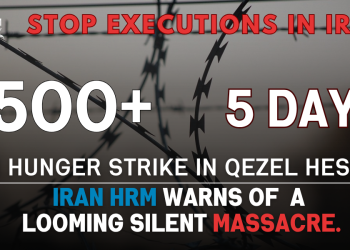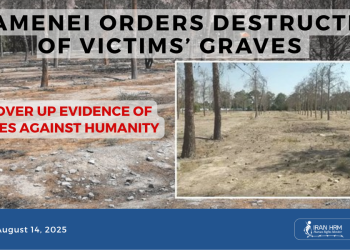Recommendations for Iran Human Rights Policy
In the aftermath of the recent 12-day war between Iran and Israel, there is a growing concern that the Iranian regime may be poised to repeat the atrocities of the 1988 mass executions of political prisoners. The current environment—marked by heightened internal repression, a surge in executions, and inflammatory rhetoric from state-affiliated media—bears alarming similarities to the conditions that preceded the 1988 massacre.
The 1988 Massacre
In July 1988, following Iran’s acceptance of UN Security Council Resolution 598, which called for a ceasefire in the eight-year Iran–Iraq War, the Iranian government initiated a series of mass executions targeting political prisoners. Estimates suggest that up to 30,000 were hanged following summary trials. Most of them were affiliated with the opposition People’s Mojahedin Organization of Iran (PMOI or MEK). These hasty extrajudicial executions and enforced disappearances have been widely condemned as ongoing crimes against humanity, including in a landmark report in 2024 by the United Nations Special Rapporteur on the situation of human rights in the Islamic Republic of Iran.
Similarities with the current situation
The recent conflict between Iran and Israel, which concluded with a ceasefire on 25 June 2025, has been followed by a marked increase in internal repression by the Iranian authorities:
- Surge in Executions: Since President Masoud Pezeshkian took office a year ago, nearly 1,400 executions have been carried out, with approximately 691 occurring in 2025 alone.
- Targeting of Political Prisoners: Dozens of political prisoners are currently on death row, including 15 convicted on charges such as “waging war on God” (moharebeh) for their alleged support for the PMOI.
- State-Endorsed Rhetoric: On July 7, 2025, Fars News, affiliated with the Islamic Revolutionary Guard Corps (IRGC), published an editorial, entitled ‘Why the 1988 Executions Should Be Repeated’ praising that massacre as a “successful historical experience” and advocated for similar measures against current detainees.
- UN Alarm: On July 4, 2025, ten UN Special Procedures mandate holders expressed alarm over the crackdown since hostilities began on June 13, 2025, noting that state-media rhetoric, including calls for “surveillance” and “killings,” echoes the “1988 atrocities”.
- New death sentences: On 12 July 2025, three opposition activists—Farshad Etemadi-Far, Masoud Jamei, and Alireza Mardasi—were sentenced to death by Branch 1 of the Ahvaz Revolutionary Court after two years of torture, accused of ‘waging war on God’ (moharebeh) over their support for the opposition PMOI (MEK).
- Rejecting requests for judicial review: On 13 July 2025, the Supreme Court rejected a fourth request for judicial review for death-row political prisoners Behrouz Ehsani and Mehdi Hassani both affiliated with PMOI, leaving them at imminent risk of execution.
- Attempt to disperse steadfast prisoners: On 17 July 2025, Political prisoner Saeed Masouri, a key figure in the ‘No To Executions Tuesdays’ campaign, smuggled out a letter from Qezel Hesar Prison after an attempt to forcibly transfer him. He warned that his removal from that prison sets the stage for executing the death row prisoners. He added that, just as in 1988, ‘a crime is in progress’.
On 19 July 2025, prison officials informed Saeed Masouri that he will be exiled to Zahedan Prison.


Parallels Between 1988 and Today
The current situation mirrors the events of 1988 in several key aspects:
- Post-War Repression: Just as the 1988 executions followed the cease fire between Iran and Iraq, the current wave of repression has intensified following the recent ceasefire with Israel.
- Use of National Security Pretexts: In both instances, the regime has used the guise of national security threats to justify the suppression of political dissent.
- Targeting of Opposition: The PMOI were prime targets in 1988 and are again facing heightened persecution.
- Lack of Due Process: The expedited and secret legal procedures are reminiscent of the summary executions carried out in 1988.
Recommendations for International Action
To prevent a repeat of atrocities similar to 1988, the international community must take immediate and decisive action:
- Public Condemnation: UN bodies, including the Special Rapporteur on Iran and the High Commissioner for Human Rights, should issue strong statements condemning the recent executions and the rhetoric advocating for further violence.
- Inclusion in UN Resolutions: States sponsoring UN resolutions on Iran should explicitly reference the 1988 massacre and the current risks of recurrence of such crimes.
- Targeted Sanctions: States should implement targeted sanctions against individuals and entities responsible for human rights abuses, including those involved in the recent surge of executions.
- International Investigations: States should support and expand independent international investigations into Iran’s current human rights violations. Specifically, the Independent International Fact-Finding Mission on Iran (FFMI) should document recent abuses thoroughly, ensuring accountability and deterring further atrocities.
The parallels to 1988 are too alarming to ignore—swift and coordinated international action is imperative to prevent history from repeating itself.







